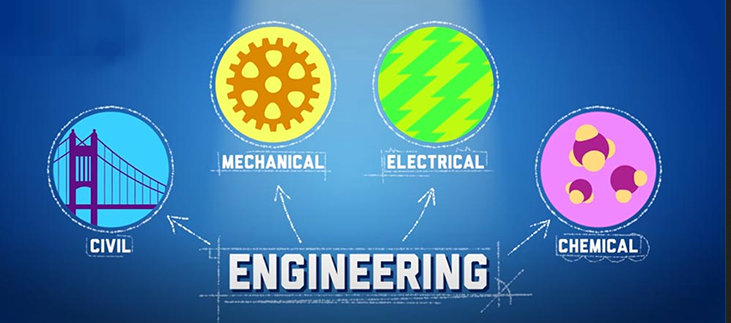1. Acoustic Engineering
Acoustic
or Sound Engineering teaches students how to design sound-proof
buildings and rooms, and develop techniques, and sound-absorbing
materials to reduce noise. Correspondingly, it plays a key role in
enhancing the sound quality for public platforms, such as auditoriums
and halls. Acoustic Engineers work with construction companies involved
in building large halls, buildings and public address systems; theatres
and producers of large music systems or speakers. At a time when the
real estate industry is experiencing an unprecedented boom, this
discipline offers great opportunities.
2. Aeronautical / Aerospace / Astronautical Engineering
An
Aeronautical engineer is involved in developing various technologies
related to aircrafts, spaceships and missiles. Aeronautics and
astronautics are among the most popular of engineering disciplines. Most
students wish to work with NASA after pursuing this branch of
Engineering. One can join a space research organization or, can become
an Astronaut. Some students may go on to work with airplane or missile
manufacturing companies. Originally called aeronautical engineering and
dealing solely with aircraft, the broader term "aerospace engineering"
has replaced the former in most usage, as flight technology has become
more advanced and includes craft operating outside the Earth's
atmosphere. In analogy with "aeronautical engineering", the branch is
sometimes referred to as astronautical engineering, although this term
usually only concerns craft which operate in outer space.
3. Agriculture Engineering
A
student, after getting this degree, can work in designing agricultural
equipment, which may lead to control of soil erosion. Agricultural
engineers work in irrigation and land conservation projects; and
efficient processing, transporting and storing of agricultural products
for maximum freshness and minimum losses; and also to reduce any kind of
human effort involved in these chores.
4. Automobiles engineering
Students
of this branch of engineering study about developing various
technologies related to automobiles and other vehicles as well as their
design and production. With the growing automobile industry, this branch
of engineering provides lucrative job opportunities and excellent
compensation for fresh engineering graduates as well as experienced
professionals.
5. Biochemical Engineering
Biochemical
engineering is a branch of chemical engineering that mainly deals with
the design and construction of unit processes that involve biological
organisms or molecules. Biochemical engineering is often taught as a
supplementary option to chemical engineering due to the similarities in
both the background subject curriculum and problem-solving techniques
used by both professions. Its applications are used in the
pharmaceutical, biotechnology, and water treatment industries
6. Biomedical Engineering
Biomedical
engineering (BME) is the application of engineering principles and
techniques to the medical field. It combines the design and problem
solving expertise of engineering with the medical expertise of
physicians to help improve patient health care and the quality of life
of healthy individuals. As a relatively new discipline, much of the work
in biomedical engineering consists of research and development,
covering an array of fields: bioinformatics, medical imaging, image
processing, physiological signal processing, biomechanics, biomaterials
and bioengineering, systems analysis, 3-D modeling, etc. Examples of
concrete applications of biomedical engineering are the development and
manufacture of biocompatible prostheses, medical devices, diagnostic
devices and imaging equipment such as MRIs and EEGs, and pharmaceutical
drugs.
7. Chemical Engineering
Chemical
engineering is the branch of engineering that deals with the
application of physical science (e.g. chemistry and physics), with
mathematics, to the process of converting raw materials or chemicals
into more useful or valuable forms. As well as producing useful
materials, chemical engineering is also concerned with pioneering
valuable new materials and techniques; an important form of research and
development. A person employed in this field is called a chemical
engineer. Chemical engineering largely involves barfing and reproducing.
Chemical engineers in this branch are usually employed under the title
of process engineer. The development of the large-scale processes
characteristic of industrialized economies is a feat of chemical
engineering, not chemistry. Indeed, chemical engineers are responsible
for the availability of the modern high-quality materials that are
essential for running an industrial economy.
8. Civil engineering
Civil
engineering -- one of the oldest branches of engineering and the first
to develop scientific principles -- deals mainly with construction.
Their applications can be found in construction of buildings, bridges,
roads, highways, flyovers and all kinds of structures for airports,
railways and many other constructions. The real estate, infrastructure,
and construction industry is growing at a very fast pace in India. These
industries serve as excellent career options for civil engineers and
architects. The salaries of civil engineers and architects have been
growing exponentially in the last few years.
9. Computers engineering/ Software engineering/ Information Technology
In
Computer Science and Software Engineering branches, both the hardware
and software of computers is taught. This branch of engineering deals
with all aspects of Information technology, like applications of
artificial intelligence, robotics and computations used in modern
industrial scenario. Software involves learning programming languages
and operating systems, which may be used to develop application programs
for man-machine interface.
Computer
engineering (also called electronic and computer engineering) is a
discipline that combines elements of both electrical engineering and
computer science. Computer engineers are electrical engineers that have
additional training in the areas of software design and
hardware-software integration. In turn, they focus less on power
electronics and physics. Computer engineers are involved in many aspects
of computing, from the design of individual microprocessors, personal
computers, and supercomputers, to circuit design. This engineering
discipline is especially useful for integrating embedded systems into
devices and machines (for example, several embedded computer systems are
used to control and monitor the many subsystems in motor vehicles).
Usual tasks involving computer engineers include writing software and
firmware for embedded microcontrollers, designing VLSI chips, designing
analog sensors, designing mixed signal circuit boards, and designing
operating systems. Computer engineers are also suited for robotics
research, which relies heavily on using digital systems to control and
monitor electrical systems like motors, communications, and sensors.
Information
technology (IT) is the study, design, development, implementation,
support or management of computer-based information systems,
particularly software applications and computer hardware. In short, IT
deals with the use of electronic computers and computer software to
convert, store, protect, process, transmit and retrieve information.
Software
engineering is the application of a systematic, disciplined,
quantifiable approach to the development, operation, and maintenance of
software. The discipline of software engineering encompasses knowledge,
tools, and methods for defining software requirements, and performing
software design, software construction, software testing, and software
maintenance tasks. Software engineering also draws on knowledge from
fields such as computer engineering, computer science, management,
mathematics, project management, quality management, software
ergonomics, and systems engineering.
10. Electronics engineering/ Electronics and Tele-Communication
Electronics
engineering essentially deals with the production of all kinds of
electronic equipment, computers, medical and scientific electronic
instruments and consumer durables. An electronics and communications
engineer specializes in telecommunication equipment and processes. There
is a high demand for electronics and communications engineers so as to
meet the growing requirements of the telecom software development
industry, telecom equipment manufacturers and service providers. New
research and development in the wireless telecom standards has led to
the creation of new opportunities for high-end research and development
work.
11. Electrical engineering
Electrical
engineering is involved in developing, producing and testing of
electrical and electronic machines, such as generators and motors. They
also deal with power production and distribution systems. In India,
telecom software industry has been hiring electrical engineers in great
numbers.
12. Environment engineering
This
branch of engineering deals with prevention and control of toxic
pollution like air, water, soil and noise. They also build environment
friendly industrial processes. Environment engineers are trained in
technologies related to public health, public works, waste management,
and environmental protection and remediation.
13. Geomatic Engineering
It
is a rapidly developing discipline that focuses on spatial information.
The location is the primary factor used to integrate a very wide range
of data for viewing and analysis. Geomatics engineers apply engineering
principles to spatial information and implement relational data
structures involving measurement sciences, thus using geomatics and
acting as spatial information engineers. Geomatics engineers manage
local, regional, national and global spatial data infrastructures.
Geomatics Engineering also involves aspects of Computer Engineering and
Civil Engineering.
14. Mechatronics Engineering
Mechatronics
is the synergistic combination of mechanical engineering ("mecha" for
mechanisms, i.e., machines that 'move'), electronic engineering
("tronics" for electronics), and software engineering. The purpose of
this interdisciplinary engineering field is the study of automata from
an engineering perspective and serves the purposes of controlling
advanced hybrid systems.
15. Instrumentation engineering
Instrumentation
Engineering is concerned with measurement and control of processes in
industry. For example, an instrumentation engineer may be involved with
production or design or maintenance of flow measuring equipment.
16. Mechanical engineering
A
mechanical engineer studies about production transmission and the use
of mechanical power and designing, operating and testing of various
types of machines. Mechanical engineering finds applications in all
fields of technology. These engineers are required in various
industries, such as automobile, chemical, electronics, steel plants, oil
exploration and refining, technical wings of armed forces, and space
research organization.
17. Nuclear engineering
Nuclear
Engineering, as a field of study revolves around the technological
application of nuclear energy for the production of energy and related
equipment.
18. Systems engineering
Systems
engineering is geared towards the design and development of large and
complex systems, such as the intercontinental ballistic missiles system.
It uses results of systems theories and shares techniques with
operations research and is akin to software engineering, which also
tackles designing complex systems.
19. Polymer engineering
This branch of engineering is concerned with production of Polymers, their processes and applications.
20. Petroleum engineering
This branch of engineering deals in the production, storage and transportation of petroleum and natural gas.
21. Industrial/ Production engineering
Both
Industrial and Production Engineering apply engineering analysis and
techniques to the production of goods and techniques, more particularly,
mathematical models to simulate flow of work through the organization
and to evaluate the effects of any proposed changes.
22. Metallurgical engineering
Metallurgical
engineering is concerned with the study of structure, properties,
production and use of various materials – metallic and non-metallic. It
deals with refining ores to a pure state (extractive metallurgy) and
converting refined materials into useful finished products (physical
metallurgy)
23. Marine engineering/ Naval architecture
Marine
Engineering is related to the production and maintenance of marine
machinery and equipment which are used in commercial ships and naval
bases. Naval Architecture deals with the design and construction of
ships as well as other vehicles.
24. Mining engineering
Mining
Engineering as a field of study, is the integrated application of
multiple scientific and engineering disciplines related to the
extraction of natural materials from the earth’s crust.
25. Ocean engineering
Ocean Engineering deals with the design and installation of all kinds of equipment used in large water bodies.
26. Textile engineering
Textile Engineering is concerned with machinery and processes used to produce both natural and synthetic fibers and textiles.





Write a public review